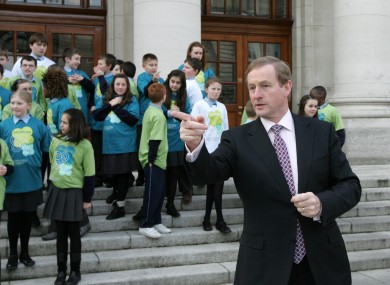Poorer society takes a big hit again ‘Budget to create for harsher times’


Social Justice Ireland director Fr Sean Healy.
The Budget of 2013 will make Ireland a harsher society and damage the economy, Social Justice Ireland has said.
Speaking a post-Budget briefing, the organisation’s director Fr Seán Healy said for the second year in a row the Government had perpetrated a transfer of wealth from the poor to the prosperous.
“Budget 2012 saw 40 per cent of the population on lowest incomes take a far higher proportionate ’hit’ than the richest 10 per cent. Budget 2013 continues this process,” he said.
In particular, he cited the abolition of the weekly PRSI threshold for all workers earning more than €352 per week, cuts to child benefit, the end of the €300 Cost of Education allowance and the trebling of the prescription charge for medical card holders to €1.50.
He said wealthier households would able to absorb cuts and tax rises.
“It is unjust that corporations maintain and receive tax relief in Budget 2013 while families continue to suffer the brunt of budgetary adjustments.”
Fr Healy said despite Government claims that job creation was central to its agenda, its efforts failed to address the jobs crisis adequately.
Given that 64 per cent of private sector workers were employed in the non-exporting indigenous sector it was disappointing the Budget would do nothing to boost domestic demand.
The provision of 10,000 additional labour activation places and €14 million for after school childcare for parents engaged in the programmes, while welcome, “do not address the core needs of 193,000 people who are long-term unemployed”.
The still low tax base after this Budget and the “over-emphasis on cutting expenditure” showed a lack of urgency about creating a job-creative society.
“Without investment there will be no jobs. Without jobs there will be no recovery. Without recovery Ireland will remain in austerity for the foreseeable future,” he said.
Young people emigration in Ireland ’disguises the dole and jobless figures’


Youth emigration is disguising unemployment figures, small business group Isme has said, attributing a drop in the numbers under 25 on the Live Register to a rise in emigration since July 2010.
In the year to November, the number of under-25s on the Live Register fell by 8,387, or 11.1 per cent, according to figures released yesterday by the Central Statistics Office.
The percentage of under-25s on the Live Register is 16.1 per cent for November, down from 17.6 per cent in November 2011 and 18.9 per cent in November 2010. “This Government is clearly failing in its efforts to tackle the jobs crisis, and no amount of long-fingered promises of multinational jobs tomorrow or airy-fairy Fás schemes will satisfy the crying need for local jobs today,” Isme chief executive Mark Fielding said.
The number signing on the Live Register fell 1,500 last month, according to the figures. The seasonally adjusted register total, which includes casual and part-time workers, was 432,300 in November.
This gave rise to a standardised unemployment rate of 14.6 per cent, down from 14.7 per cent previous month.
Having peaked at 15 per cent in February, the numbers signing on the Live Register have started to fall gradually. Merrion economist Alan McQuaid said increased emigration and people staying on longer in education contributed to the fall.
Irish Woman terminally ill with MS asks court for the right to die
Marie Fleming (58) is terminally ill in the final stages of multiple sclerosis and is seeking orders which would permit her be helped lawfully take her own life if and when she chooses.
A woman who is terminally ill with multiple sclerosis has appealed to the High Court to save her “a horrible” death and allow her be helped to lawfully die with dignity among the people she loves.
Marie Fleming, giving evidence from a wheelchair to the three judges, said she had come to court “while I can still use my voice to ask you to assist me in having a peaceful, dignified death”.
She had fully thought the matter through, talked about it non-stop with her partner and family, and had planned every detail down to her funeral where she wanted a wicker coffin, jazz music and her life to be celebrated.
To have a peaceful death, she needed assistance and had called upon her partner and carer for the last 18 years, Tom Curran, who had said he would help her if it was lawful to do so, she said.
Ms Fleming, a 58-year-old mother of two who lives in Co Wicklow, who also a stepson and grandchildren, said she had discussed her wishes at length with her family.
While there had been “a lot of tears shed and questions asked”, they could see her life had deteriorated to such an extent she could no longer help herself with the most minor things like showering or feeding. They supported her in her wish to be permitted to take her own life, with assistance, if and when she chose to do so, she said.
Under the existing law, if she was assisted in taking her own life, a sentence of up to 14 years could be imposed and she did not want to leave her partner or family in that situation.
“Tom has promised to help me, only if it’s lawful. Otherwise, I will die a horrible death which could take months or even a year.”
She knew another woman with MS who had starved to death, she said. “That’s not how I want to go, I want to go peacefully in my own home with the people I love around me.”
Because of her deteriorating situation and the fact she is effectively paralysed, the option available to her involved the use of gas via either a mask being placed over her face or via a canula into her arm. Her doctor had said “she will not kill me” but would help if it was lawful, she said.
Ms Fleming said she was ready to die. “i am at peace with the world, I have put all my wrongs to right, I have sorted all in my head, I have even arranged my funeral.” She would also be very happy to have an independent witness attend at an assisted suicide, she added.
“I have nothing to hide,” she said. When she met her partner, they fell in love and he “has been there with me for 18 years through good and bad”, she said. “We fell in love but I don’t think he signed up for what he got, he probably thought we could go on for ever.”
Ms Fleming also said palliative care was not an acceptable option for her. She did not want to be kept in a comatose state with large doses of pain killers.
“To be kept in a state of not being able to smell the flowers or see my beautiful garden or just see the changes in the seasons, that’s not acceptable for me to miss all that. I would be doing myself an injustice.”
She was giving evidence from the back of a packed and hushed court where the three judges had left the judges bench and sat on the press benches in order to hear her. Her children and other family members were in court.
Ms Fleming is seeking orders allowing her to be lawfully assisted in taking her own life and claims the absolute ban on that breaches her rights to autonomy, privacy and dignity.
The State is opposing the action and contends there is no right to die under the Constitution. It also argues removal of the absolute ban on assisted suicide could lead to vulnerable people being overborne to take their own lives.
Suicide is not illegal here but it is an offence under the Criminal Law Suicide Act 1993 to be an accomplice to such an act and a jail sentence of up to 14 years may be imposed for that offence.
In her case against Ireland, the Attorney General and the DPP, Ms Fleming, a former lecturer at University College, Dublin, wants an order declaring Section 2(2) of the 1993 Act invalid under the Constitution and incompatible with the European Convention on Human Rights.
She contends Section 2.2 breaches her rights to live and to die, bodily autonomy and self-determination, privacy and to be held equal before the law.
Alternatively, she wants an order requiring the DPP to issue guidelines setting out what factors are taken into account in deciding whether to prosecute a person who assists her in ending her life.
In opposing the action, the State agrees the 1993 Act allows for no exception to the offence of aiding a suicide but says that does not exclude the application of any general defence available at common law. It denies the 1993 Act breaches Ms Fleming’s constitutional rights and specifically denies the Constitution expressly or implicitly confers a right to die upon any person.
Section 2.2 is necessary for the promotion of the common good and the public interest as it is designed to cover the many circumstances in which one person might aid another in a suicide, the State pleads.
The State also denies that the DPP has any obligation to publish any policy or information stating what factors would be taken into account in deciding whether to prosecute a person who assisted another in a suicide. The absence of such guidelines does not breach Ms Fleming’s rights under the Constitution or Article 8 of the ECHR, it is also pleaded.
Five years ago, Ms Fleming registered with Dignitas, the clinic in Zurich, Switzerland, where terminally ill patients can bring about their own deaths under the supervision of qualified doctors.
Ms Fleming said she did not travel then because Mr Curran dissuaded her and due to her own misgivings at dying “far from my own home and most of the people I have loved”.
Warning of massive resistance on the new property/household tax changes?


Budget 2013 sees the much-anticipated new 0.18 per cent property tax rate become a reality and which may trigger off a series of boycotts and rallies around the country.
Campaigners have warned of deepening boycotts against tax on family homes as Budget 2013 heralded the much-anticipated new 0.18% property tax rate.
Despite assurances that it will not rise over the next three years, Socialist Party TD Joe Higgins said the level of opposition will soar.
“Fifty per cent of homeowners continue to boycott household tax, which will be intensified as this new burden comes in. There will be massive resistance,” he said.
The scheme will cost average homeowners between €250-300 euro a year with a higher mansion tax rate of 0.25% for homes worth a million euro-plus.
Gregor Kerr, spokesman for the Campaign Against Household & Water Taxes (CAHWT), said the tax was a declaration of war on people.
“Campaign members across the country will respond to this provocation by re-doubling and intensifying both the boycott of the property tax and protests against it and against the austerity agenda,” he said.
Latest figures from the Local Government Management Agency put half a million homeowners in the boycott bracket. Some 1.1 million homes have been registered to pay the Household Charge as it stands, bringing in 111 million euro.
The CAHWT declared the mansion tax a diversionary tactic and unacceptable. “A real wealth tax would have imposed a levy on the massive wealth owned by the richest 36,000 people who between them own approximately 130 billion euro,” Mr Kerr said.
Vincent P Martin, lawyer and founder of the New Beginning group which campaigns for debt settlement, said: “This new tax will further strangle an already squeezed Middle Ireland, ordinary people who are in deep negative equity, extreme mortgage distress, and who simply cannot pay.
“The property tax is not an alternative to increased income tax, it is just a means of extracting more money from people who cannot afford it.”
Primitive cave art animals ‘more accurate’


Prehistoric illustration of an elephant from the Tadrart Acacus cave in Libya
You could call it primitive art – but stone age man knew what he was doing when he daubed figures of animals on cave walls.
In fact, many modern artists could learn a lesson or two from their ancient forbears who lived up to 30,000 years ago, scientists claim.
The lifelike images found at sites such as the famous Lascaux Cave in south-west France are said to demonstrate an ability to depict animal movement superior to that seen today.
Researchers in Hungary examined prehistoric and modern artworks of paintings and statues of animals including horses, bulls and elephants. They found that the majority of depictions of animals walking or trotting had the legs wrongly positioned.
However, prehistoric paintings had the lowest error rate of 46.2%. In contrast, modern era artworks of animals in motion prior to the late 19th century were incorrect 83.5% of the time.
Even Leonardo da Vinci, famous for his anatomical drawings, got it wrong when he tried to portray animal movement.
After the pioneering work of Eadweard Muybridge, who made the first detailed studies of animal gait in the 1880s, the error rate decreased to 57.9%. But even then, pictures of moving animals could not match those of the cavemen for accuracy.
The research, led by Dr Gabor Horvath from Eotvos University in Budapest, appears in the online journal Public Library of Science ONE.
In their paper the scientists wrote: “Cavemen were more keenly aware of the slower motion of their prey animals and illustrated quadruped walking more precisely than later artists.”
The Lauscaux Cave in the Vezere Valley of France’s Dordogne region contains nearly 2,000 figures of animals, human figures and abstract signs painted onto the walls with mineral pigments. They include more than 300 pictures of horses, 90 paintings of stags, cattle, bison, cats, a bird, a bear and a rhinoceros. Among the most most famous images are four huge black bulls, or aurochs, one of which is 17ft long.
TDs say Judge Mary had penalty points wiped by Gardai


Opposition TDs have named Judge Mary Devins as one of the high-profile people who had penalty points wiped from their licences by gardaí.
Both Clare Daly and Joan Collins of the United Left Alliance named Judge Mary Devins in the Dáil yesterday.
They said it was “outrageous” that points had been wiped from people’s licences in this fashion.
Their comments came after it emerged senior gardaí had been using their discretion to wipe points from certain licences since the introduction of the system in 2002.
Although the procedure is meant to be used only for legitimate reasons, Transport Minister Leo Varadkar last week confirmed the receipt of information alleging misappropriate use of it.
It is believed there are two whistleblowers, both members of the gardaí.
The matter was referred to Justice Minister Alan Shatter, who received an interim report on the issue from gardaí in recent days.
It has been reported that tens of thousands of people, including several celebrities, have seen penalty points wiped.
Ms Daly, Ms Collins, and Independent TDs Mick Wallace and Luke Ming Flanagan tried to raise the matter yesterday.
They were repeatedly ruled out of order by Michael Kitt, the leas ceann comhairle, but not before Ms Daly and Ms Collins named the judge.
“Judge Devins has been named in the newspapers, as have sports figures and other officials, including gardaí. We are talking about the loss of millions to the State,” said Ms Daly.
“The Government has had in its possession kn-owledge of the systematic writing-off of motoring offences for almost a year and it has done nothing.”
Ms Collins said: “There are fixed-term notices and judges are giving down charges to people with penalty points and Mary Devins is named in this. It is outrageous.”
However, Mr Kitt reminded the TDs that persons not in a position to defend themselves were generally not named in the Dáil.
“The general practice is that such persons should not be named or referred to in such a way as to make them identifiable, particularly where to do so would be an unreasonable invasion of privacy or where the reference could be in the nature of being a defamatory utterance.”


No comments:
Post a Comment